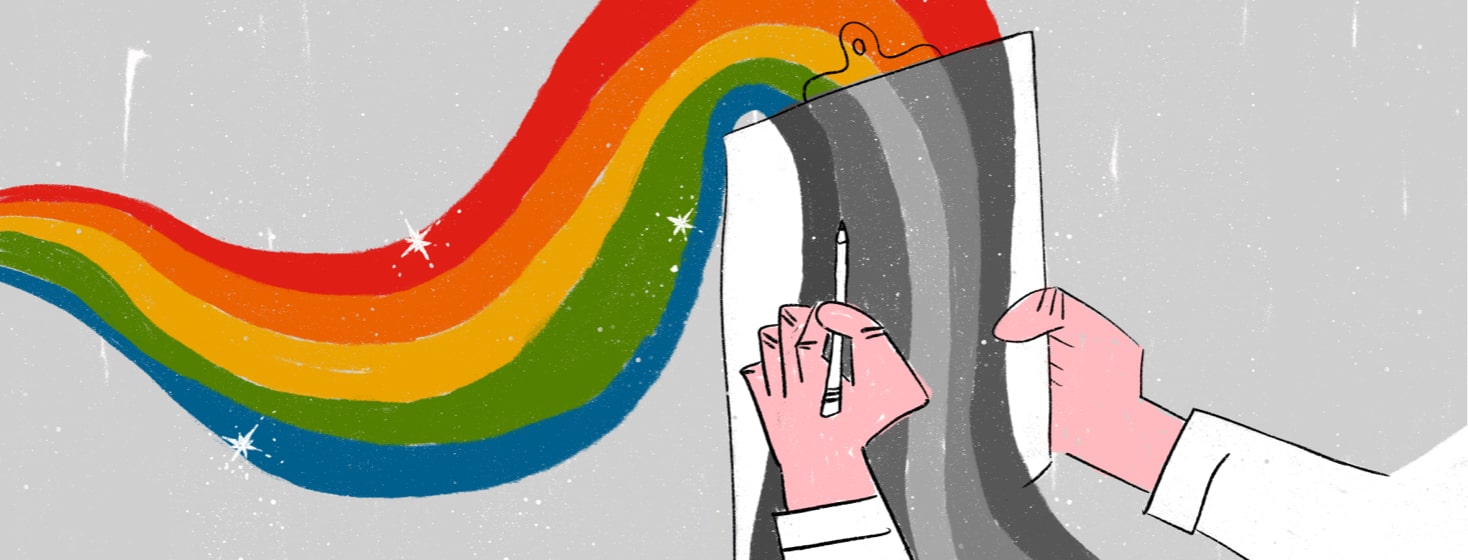Effects of Heteronormativity in Healthcare on LGBTQ+ Patients
From the start, I want to be clear that I do not intend to paint with a broad brush here. There are many wonderful, empathetic practitioners out there in the healthcare field who do their best to avoid the types of biases this article discusses. But unfortunately in my experience (and as documented in countless research articles) the healthcare industry as a whole is still bogged down by heteronormative and cis-gender biases.
There are so many ways that overt or covert heteronormativity can affect non-hetero individuals within the healthcare industry. Those ways range from emotional, felt affects to real, measurable disparities in receiving sufficient care.
In fact, a 2015 experimental study out of Duke University states that “heterosexual assumptions communicated by a health care professional have been reported to lead to a feeling of invisibility, fear of mistreatment post-disclosure, lack of trust and confidence in the physician, and lack of disclosing sexual orientation.”1 Let’s break those (and a few additional outcomes) down a little.
Feeling of invisibility
All of us battling axial spondyloarthritis know what it’s like to live with an invisible illness. To live with disbelief reflected in the faces of friends, family, and acquaintances who cannot see our disabilities and cannot think beyond the visible. Many of us even contend with physicians and rheumatologists (yes rheumatologists!) who do not believe our level of pain.
And then women often contend with an additional level of disbelief when it comes to expressed pain. Add to that another level of invisibility from physicians who communicate with hetero assumptions and the evidence against trusting physicians and the healthcare industry becomes overwhelming. After all, how can one trust a physician who does not see each individual patient for who he, she or they is?
Incorrect or incomplete medical history collected by physician
Let’s face it, there’s information that should be collected from non-hetero patients that’s different from information gathered from hetero individuals. That information leads to better medical history and can better inform a physician’s recommendations. In my experience, a full medical history including my sexual orientation and identification as a queer person could better inform physician recommendations in regards to reproductive health and care. For many members of the LGBTQ+ community, including trans individuals who are still routinely discriminated against in the medical field, the implications of incomplete medical histories are far-reaching.
Lack of trust in the physician
This seems self-explanatory. I mean, if a physician refuses to see their patient for who they are and fails to collect appropriate medical and personal information, then how is that physician trustworthy? And a good relationship with a healthcare provider is predicated on trust--trust that the provider is listening, considering all factors, and including the patient in their medical recommendations.
Lack of trust in the healthcare industry
That lack of trust becomes increasingly problematic when it extends to the entirety of the healthcare industry. But if a patient continually runs up against bias from practitioners in the healthcare industry, then that lack of trust becomes pervasive. Consider the fact that “fifty percent of respondents in the 2010 National Center for Transgender Equality survey described having to educate their physicians about trans healthcare!”2 If patients have to educate their healthcare providers about their own healthcare needs, then why would those patients continue to seek out care from healthcare providers in the first place?
Unwillingness to follow treatment directives or seek out treatment
As is becoming obvious, this list demonstrates a progression of choices and repercussions that result from heteronormativity and cis-gender biases in the healthcare industry. Each number in this list appears as the next logical reaction for LGBTQ+ individuals when faced with bias and discrimination. When one loses trust in a physician, and then loses confidence in the entire healthcare industry due to multiple experiences of bias, then one develops an unwillingness to follow treatment recommendations or to seek out care. But that doesn’t mean that queer individuals do not need care. Instead, it reflects a significant limitation of the healthcare industry here in the U.S. and abroad, which requires queer individuals to develop avoidant coping mechanisms and potential health disparities.
Health disparities among the LGBTQ+ community
There are many examples of health disparities among members of the LGBTQ+ community, some resulting from inconsistent screening for breast cancer and other conditions, others resulting from other factors. One example is that "sexual minority women" are “at increased risk for anxiety, depression, and alcohol use disorders (AUDs) compared with heterosexual women.”3 Since there are concrete, measurable health disparities among non-hetero and non-cis gendered individuals, it seems obvious to me that something should change.
Unfortunately, we all still live in a world where prejudice and bias abound, often in places we think of as unlikely. While there have been giant strides in the right direction in recent years, there’s still a lot more work to be done. In the medical field, both medical education and scientific research contribute to those biases. One study shows that, “in the United States, during preclinical years, medical students spend a median of only 5 hours discussing LGBT issues with regard to health care”1 yet various surveys indicate that as many as 5.6% of individuals in the U.S. identify as part of the LGBTQ+ community.1
But change can only come if there’s a call for change. I myself are working on being courageous and calling out examples of bias in the healthcare field when I see it. I am hopeful that with greater awareness and ample allies, that change we need will come.

Join the conversation